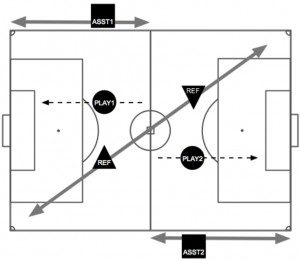
This summer, off and on, I have been following The World Cup – the most popular and engaging sport in the history of the human race, I am sure. Maybe you have been following The Cup, too.
If you have, and if you are any sort of fan at all, you may have wondered from time to time about the game’s officiating. This year’s Cup provided multiple opportunities. There were obvious goals unscored. There were blatant infractions unnoticed. And who did not wince when De Jong of the Netherlands booted Alonso of Spain squarely in the chest in the first few minutes of the final – and was not immediately ejected from the game? (I mean, really…!)
In the days since the games were concluded, I have come across a scientific study of football officiating conducted by the University of Pennsylvania. It turns out that officiating is a matter of perspective (who would have guessed?) in strange and subtle ways. The language spoken by an official, even, may affect the way he officiates. The study noted that if an official speaks a language that reads from left to right, he will tend to overlook fouls committed in left-to-right play – and will notice significantly more fouls in play that moves in the opposite direction. The reverse seems true for officials who read from right to left.
A perceptual bias is at work here. “Left-to-right” officials read their entire world in a “left-to-right” way, it seems. Left-to-right movements are somehow perceived as normal and acceptable; infractions incurred in left-to-right play do not always catch their attention. Movements in the other direction, however, appear somehow abnormal and unfamiliar. Fouls committed in right-to-left play are significantly more likely to stand out – a bias that amounts to three additional fouls per game, on average.
We see this kind of bias, I think, everywhere and all the time. We learn to “read” the world in a single, culturally conditioned direction. When things “fit” our preferred reading, we hardly notice them. Egregious “fouls” may go unnoticed; we simply go with the flow.
Elastic morals and relativistic faith? No foul here: we go with the flow. Materialistic priorities and behaviors? Nothing alarming: we go with the flow. How about teaching the Bible as a collection of fables? Or presenting the Gospel of Jesus Christ as something now passé? How about minimizing sin? Or commending sin, conceivably, if it seems sometimes a courteous idea? Cry foul? Oh, no: we have learned to go with the flow. Here in the modern western church, we have become utterly tolerant with regard to morality, inclusive in questions of doctrine and faith, flexible with regard to the claim of truth, and bendy and variable with respect to the Word of God. This has become simply the way we view things. We see no “fouls” in this direction. The bendier the better, in fact.
Professional World Cup arbiters, actually, know something about this perceptual bias. This may be why referees will patrol on a diagonal between the corners, while their assistants remain on one side of the field. Someone, sometimes, should view the action against the grain.
And we could do this, too, if we had the mind to. It would involve, maybe, reading the Bible with the church around the world instead of to the church from our sophisticated western perspective. It would mean qualifying our sophisticated opinions with a touch of humility. It would mean permitting the Word of God at some point to address us as the Word of God, rather than clever illustration for our own preconceptions.
And it would mean mission, too. It would mean hearing the blessed Gospel as the announcement of Utterly Spectacular Grace, beyond every human effort and possibility – and becoming by grace its ambassador in the world. Not its arbiter or reinterpreter, mind you, but its gladly surrendered representative. When we travel the diagonal to the other side, you see, we may come to see the direction of play correctly. The Gospel is our arbiter and interpreter, not the other way around. And there is nothing at all bendy or passé about it. If we have heard the blessed Gospel – and if we have come to believe – we are by grace remade. The Good News of grace in Jesus Christ calls and chooses us. And then it sends us into the world.
¡EXELENTE! Muy claro y directo, me ha gustado mucho tu escrito, y tienes razón, Dios te Bendiga
Gracias, Martita, por tu afirmación — y por tu amistad en el evangelio a lo largo de los años. Me has enseñado a transitar el diagonal. Gracias.